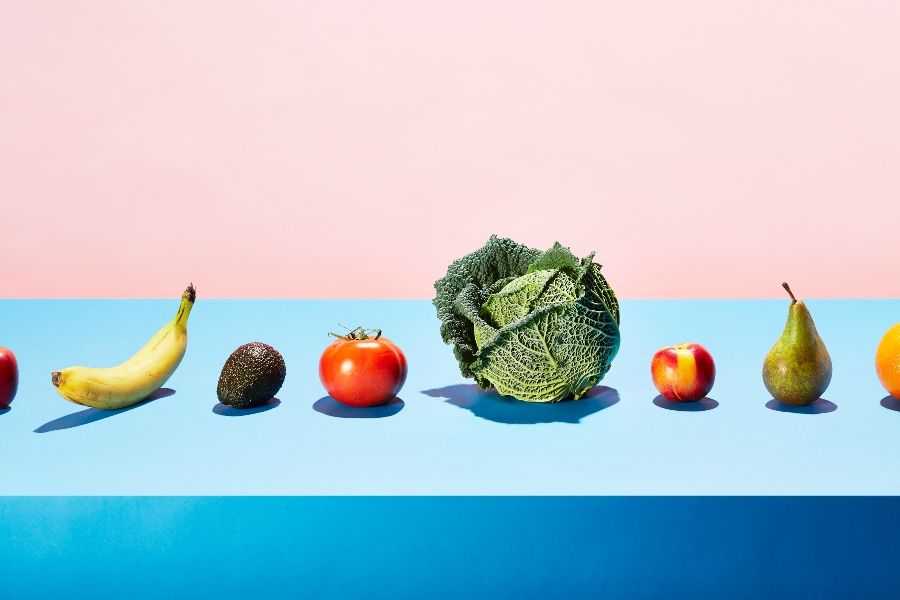My Produce Is Spoiling Fast. How Can I Make Fresh Food Last Longer?
Four Philly nutritionists and dietitians share their best food storage hacks, like how to keep spinach from wilting and asparagus from rotting.

Want your produce to stay fresher longer? Check these top fruit and veggie storage hacks from four Philly nutritionists and dietitians. / Photograph courtesy of Getty Images.
Last weekend, my fiancé ventured out to the supermarket for a massive grocery haul. Because of ‘Rona, we’ve limited our grocery trips to about once every four weeks, as we buy from a wholesale club. The problem with buying in bulk? Fruits and veggies are the first to kick the can. Pretty quickly, our cucumbers softened, our bananas browned, and our potatoes sprouted eyes (super creepy!).
No matter where you buy your produce from, there’s always the concern of “How long is this stuff going to last?” To help keep your fruits and veggies fresh longer, we asked four local nutritionists and dietitians for their produce storage hacks. Below, find their tips for extending the shelf-life of popular produce, so that you don’t have to worry about that lettuce wilting or those berries molding as fast as usual.
Apples
According to dietitian Dalina Soto, apples should be kept in a fruit bowl on the counter. However, if you see a badly bruised or over-ripped apple, you might want to move it away from others because the plant hormone they excrete, known as ethylene, can cause the “good apples” to ripen faster and go bad. If you slice them up and aren’t able to eat them all, a trick from keeping them from browning is adding some lemon juice, whose vitamin C slows the oxidation process.
Asparagus
To keep asparagus fresh, dietitian Joy Saudargas recommends placing it in about one to two inches of water, stem down, in the refrigerator. “I like to cover it with a plastic storage bag also, as this helps the asparagus to stay fresh for up to a week,” she says.
Avocados
Ah, the beloved fruit that turns on us oh so quickly. If you buy them in a bunch, it can be tricky to eat them before they all go bad, but nutritionist Beth Auguste reminds us that avocados ripen fastest in a brown paper bag, medium-ish on the counter, and slowest in the fridge. For any that are refrigerated, you should use within three to five days.
If you use only half of one, Saudargas adds to leave the pit in the other half and wrap it in some sort of plastic wrap to maintain quality. You can also add an acidic agent like lime or lemon juice, vinegar, or onion to help prevent the avocado from oxidizing. Keep in mind that it’s okay for your avocado to be a little brown here and there after you have used some of it!
Bananas
Maybe you’ve seen plastic wrapped around banana stems at the store and wondered why. Well, it’s there to prevent the banana from emitting ethylene (the same gas that apples release!) that causes them to ripen too quickly. At home, you’ll want to follow suit and seal the stems with plastic to slow browning.
Berries
Soto suggests inspecting your berries before placing them in the fridge, as one moldy one can cause the rest to go bad quickly. If you spot a bit of mold, Auguste says to rinse berries in a solution that is one part white vinegar and four parts water. This should kill the mold and pre-mold cells, so that your berries stay fresh longer.
Celery
Easy hack: keep celery heads whole (if you can) and wrap tightly in aluminum foil. This should keep them crisp for up to four weeks.
Eggplant
According to Auguste, eggplant doesn’t like the cold (who does?), so store it in a plastic bag close to the refrigerator door to preserve it.
Greens (lettuce, spinach, kale, bok choy, etc.)
If you’re looking to keep your greens as fresh as possible over time, stuff some paper towel between the leaves. Auguste says this will soak up the water that the greens sweat out, reducing condensation and damage to the cell walls (aka wilting).
According to Saudargas, pre-freezing your greens is also an option if you’re looking to maintain freshness, especially if you want to add them to soups, stews, or smoothies. “When frozen at peak freshness,” she says, “nutrients are locked in and these greens can be kept in the freezer for up to nine months.” To do so, line a baking sheet with parchment paper, and place the greens in a single layer. Put in the freezer for two to three hours. When frozen, move the greens to an airtight container or freezer bag, and use at your leisure. No blanching is involved, making for a pretty simple hack.
Naturally long-lasting produce
Some produce will just naturally last longer than others, which is a major win! Nutritionist Sheena Pradhan says root vegetables like whole carrots and potatoes will stay fresh for a good amount of time. Plus, beets, cabbage, cranberries, garlic, ginger, lemons, and pomegranates can be kept in the fridge for about two weeks.
If you’ve got potatoes and onions, you’ll want to store them separately so each lasts longer. Both release moisture, yielding quicker spoiling. (Fun fact: our potatoes sprouted so fast because we stored them with onions; if only I had had these tips then!)
Scallions
Bet you didn’t know that scallions grow well in a vase of water. Auguste suggests putting them on display like flowers; you’ll be able to eat them for a month.
Want to hear more from us? Join Be Well Philly at:
FACEBOOK | INSTAGRAM | NEWSLETTER | TWITTER


